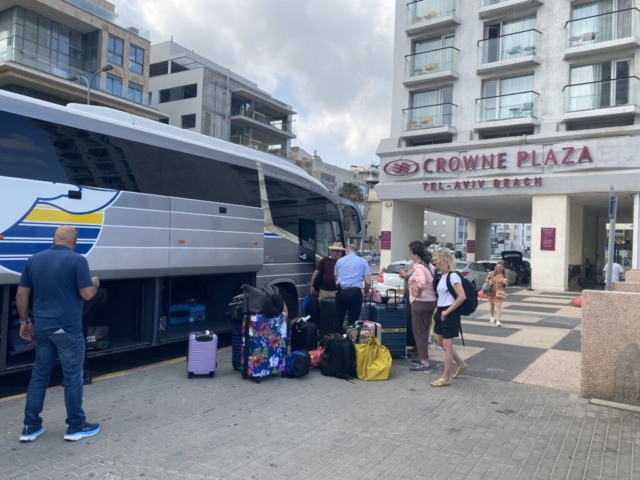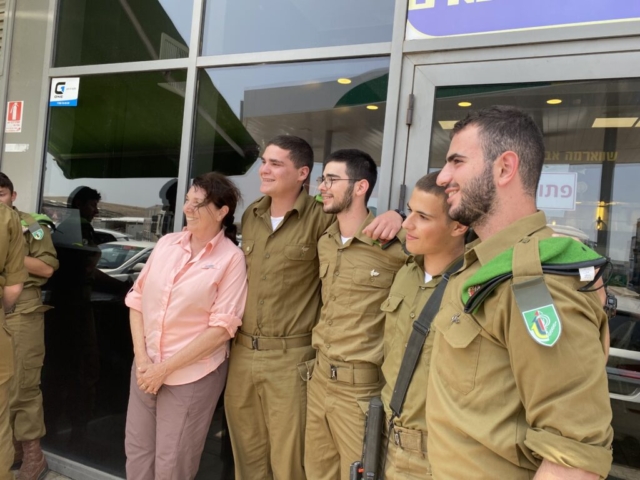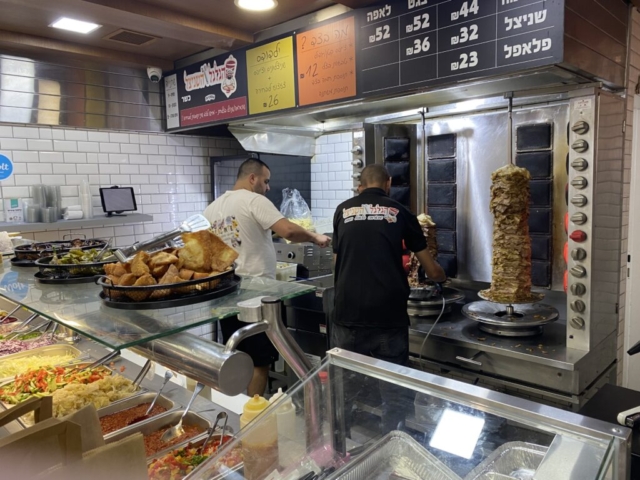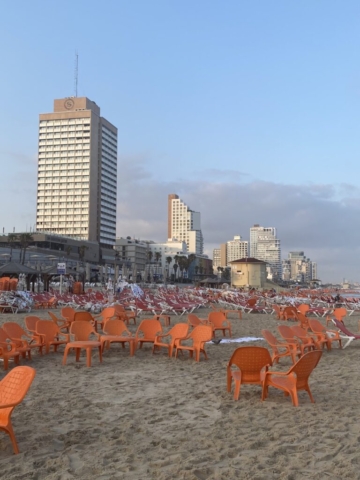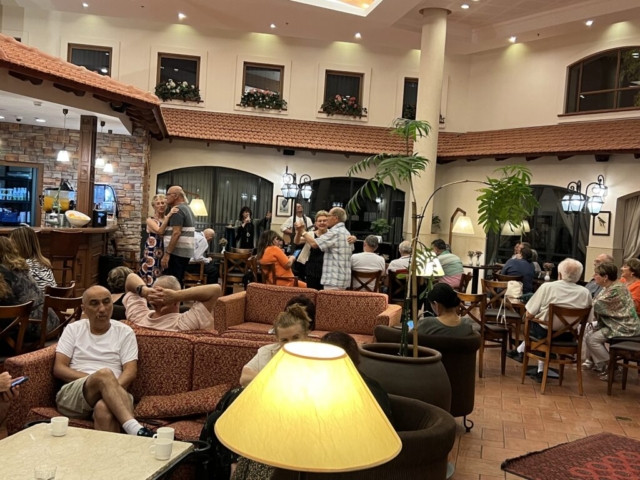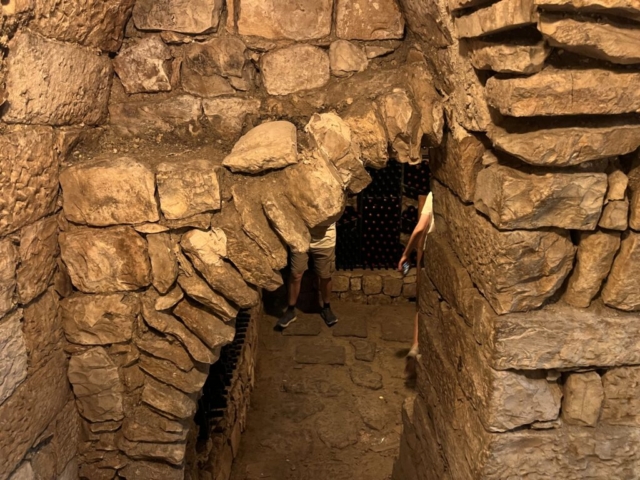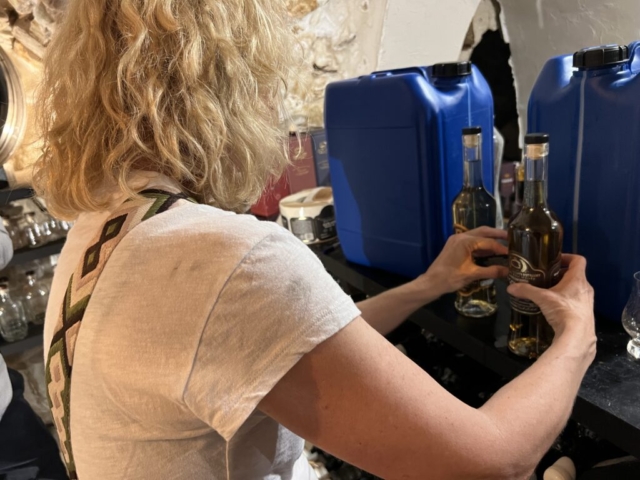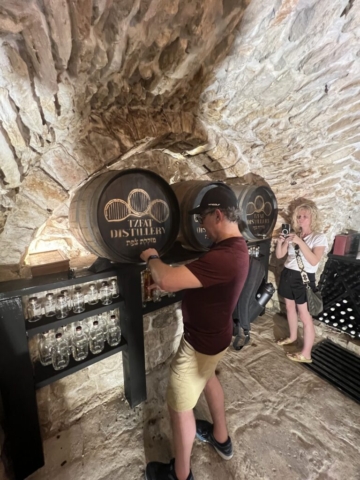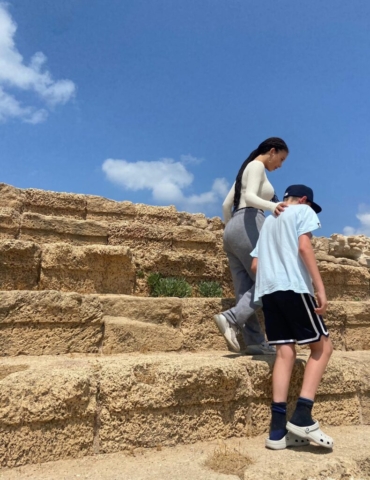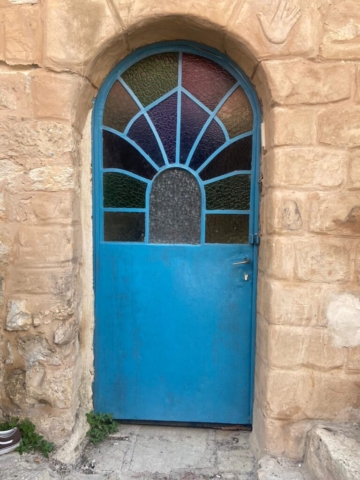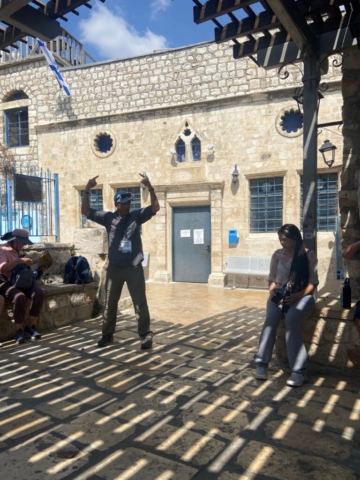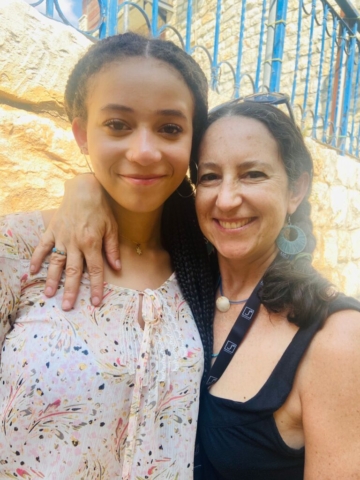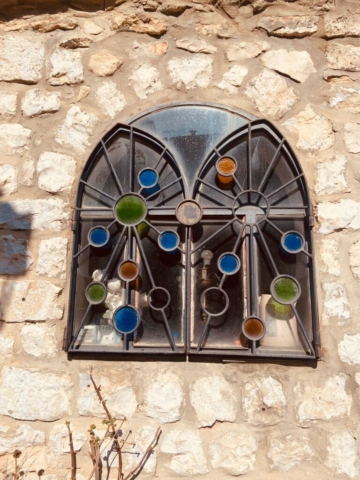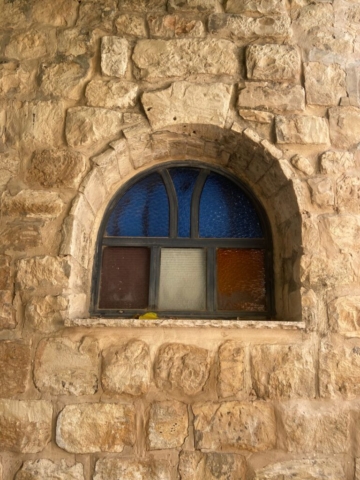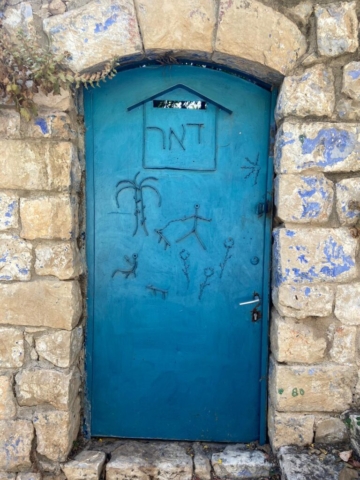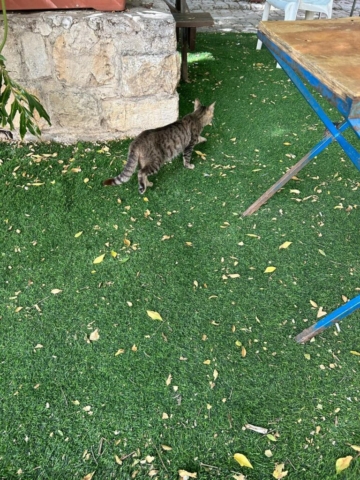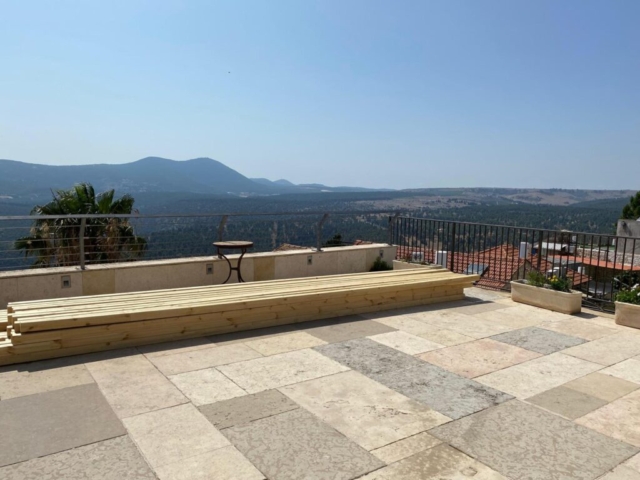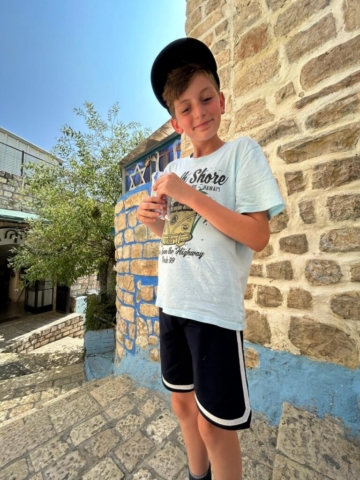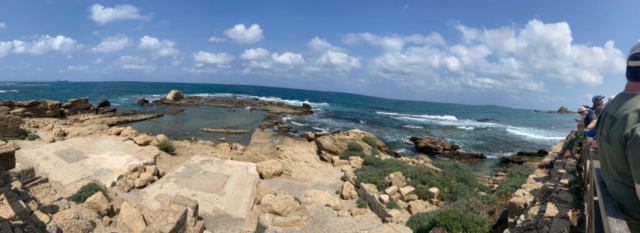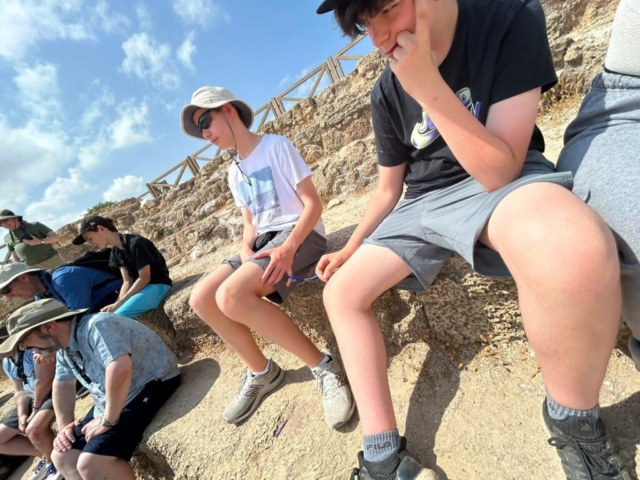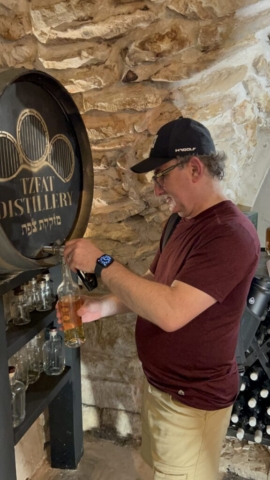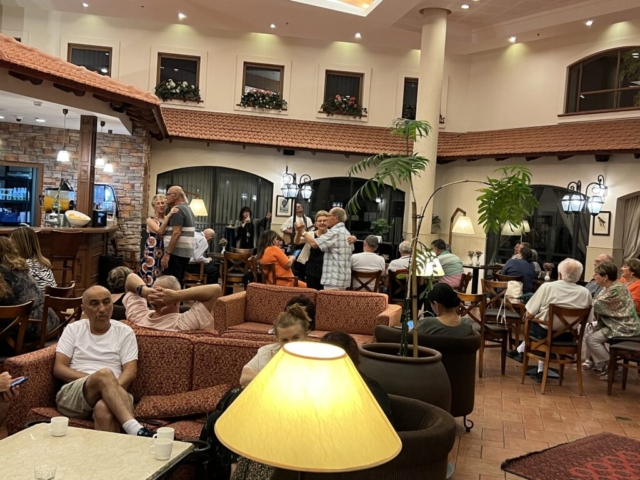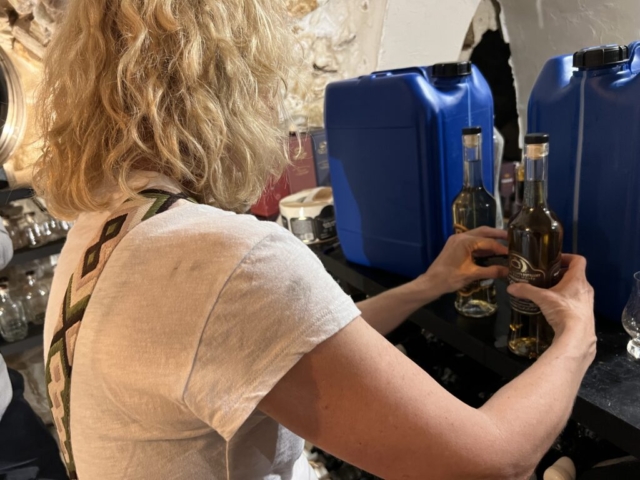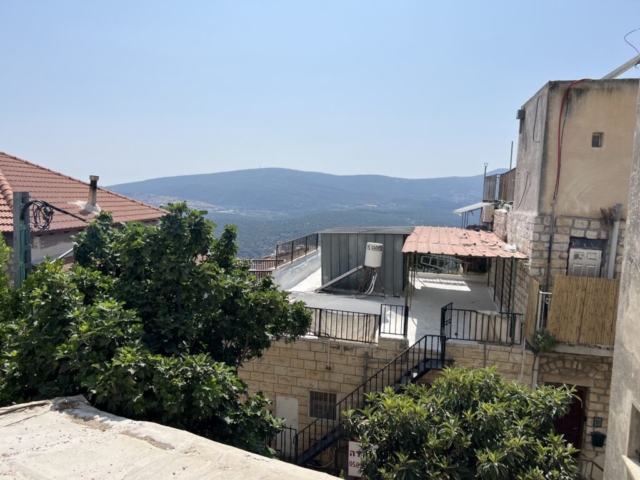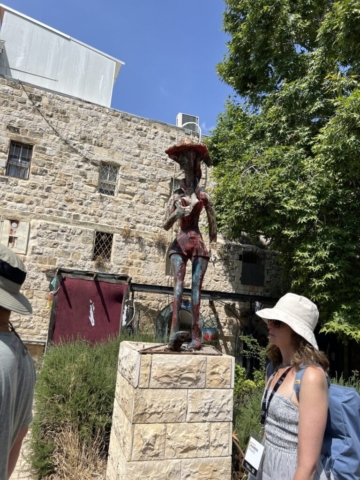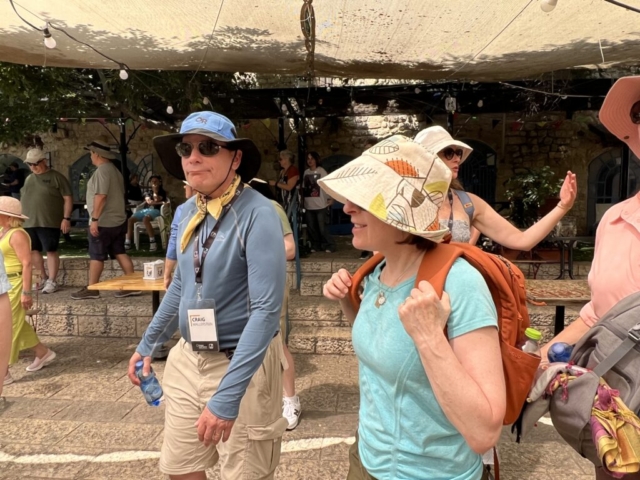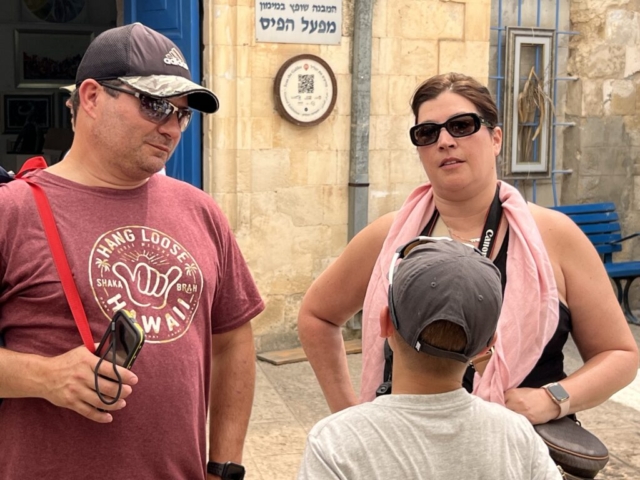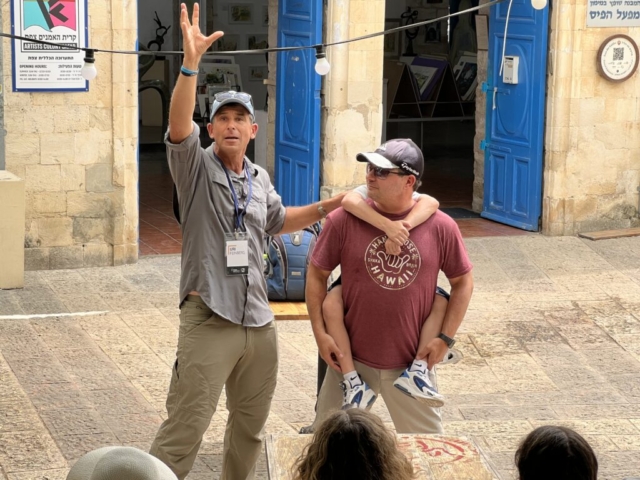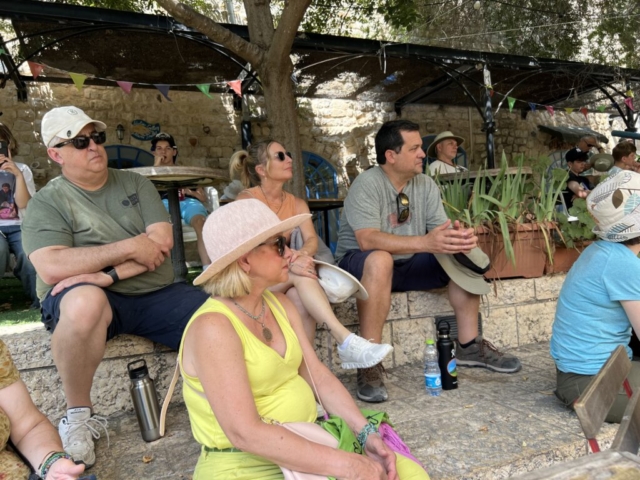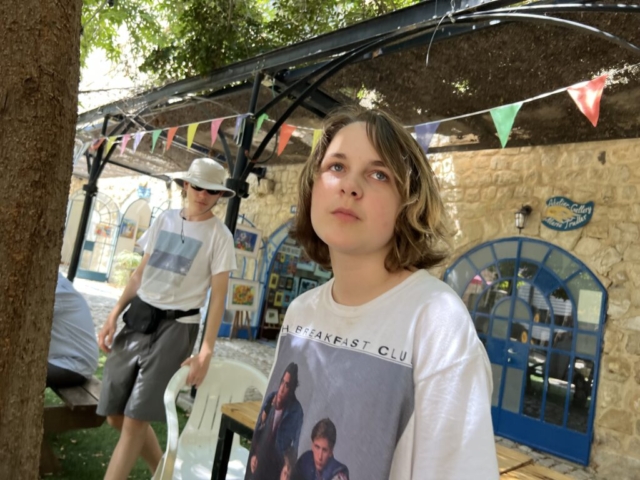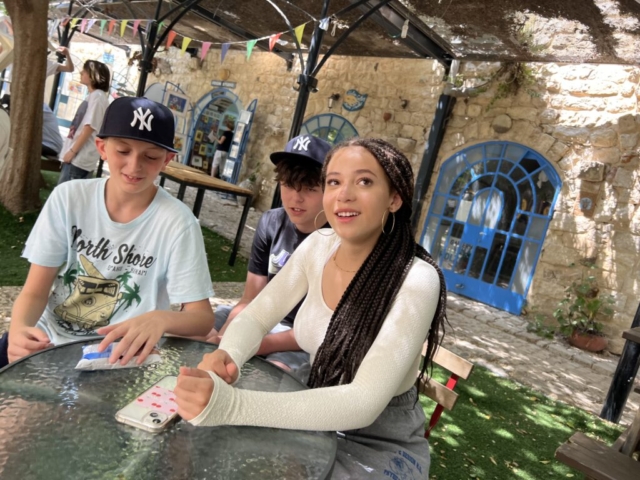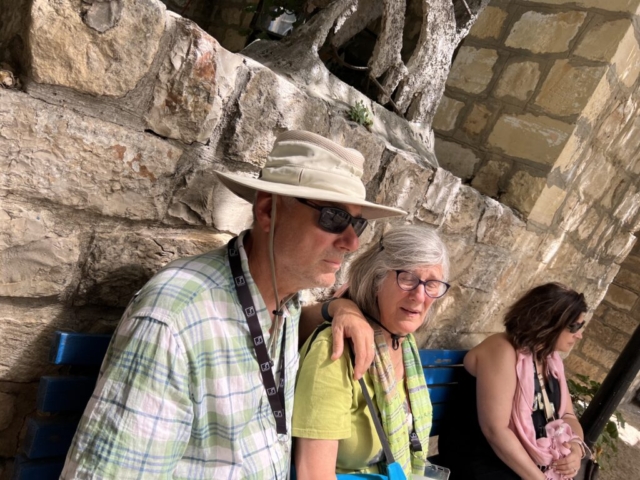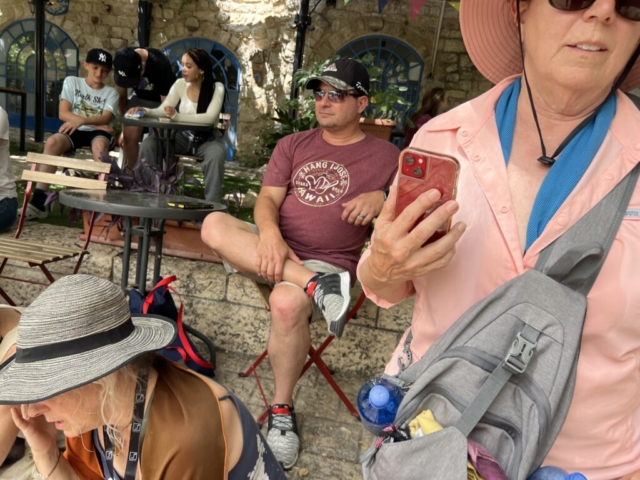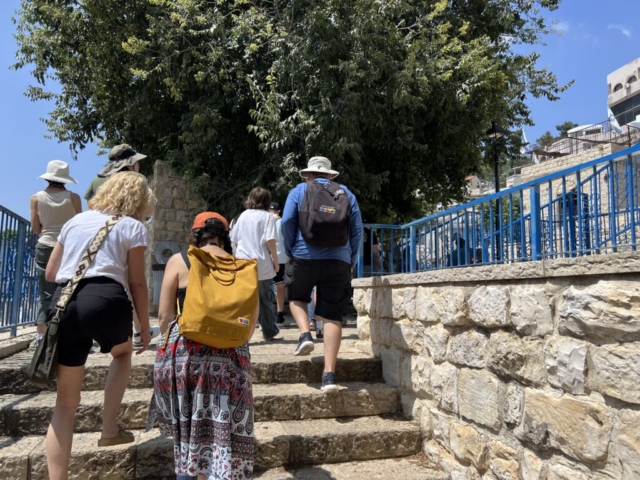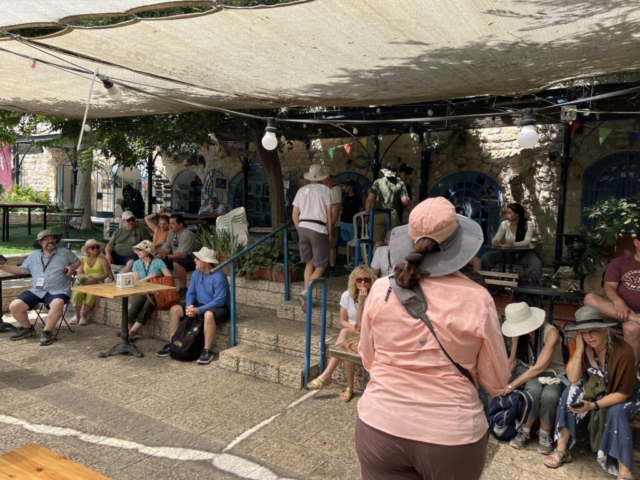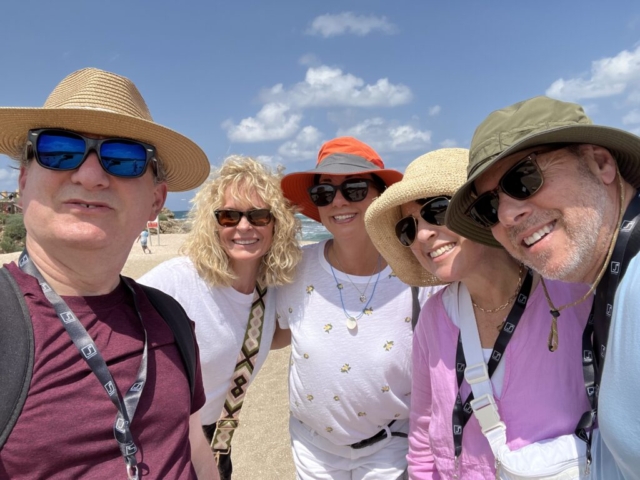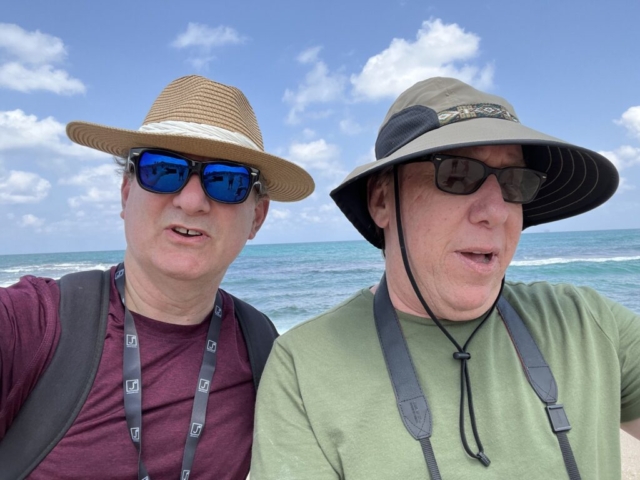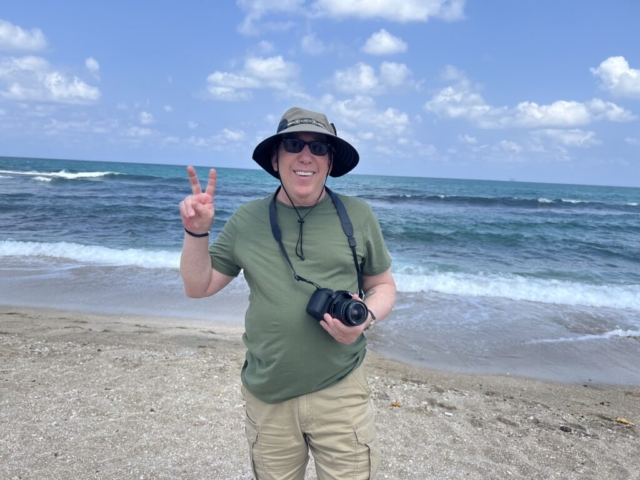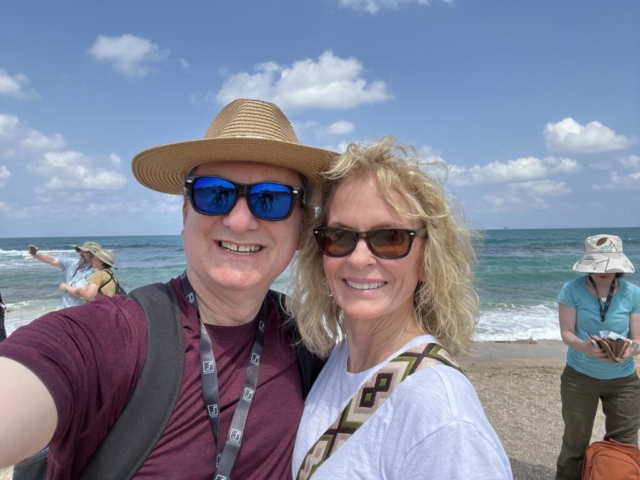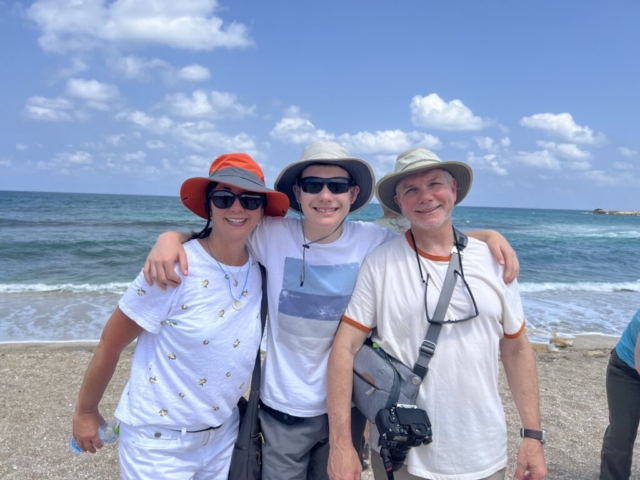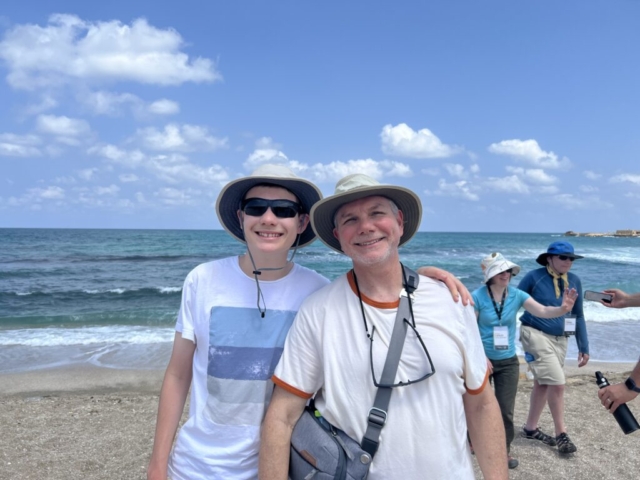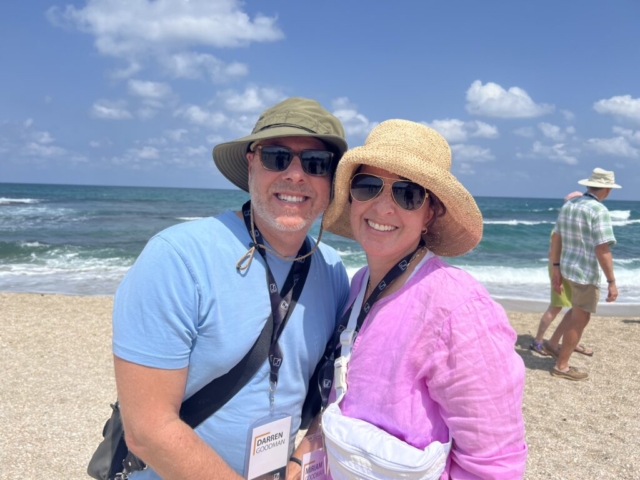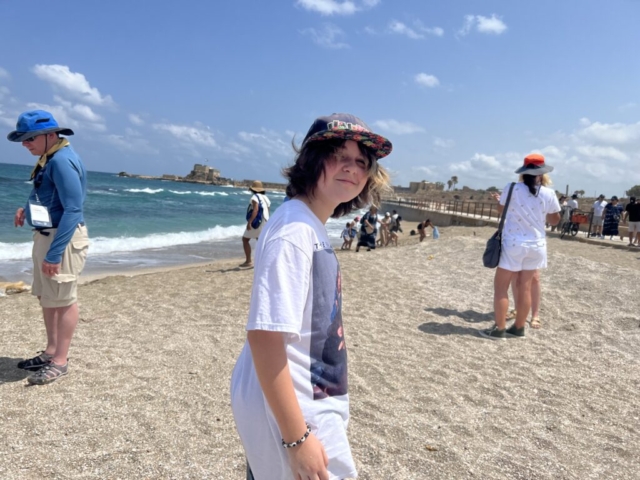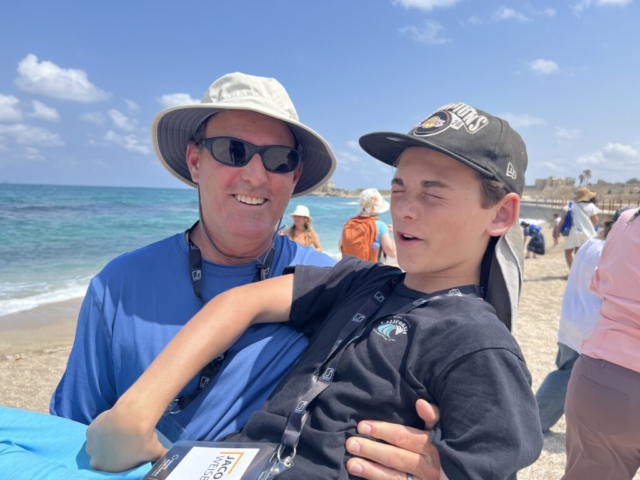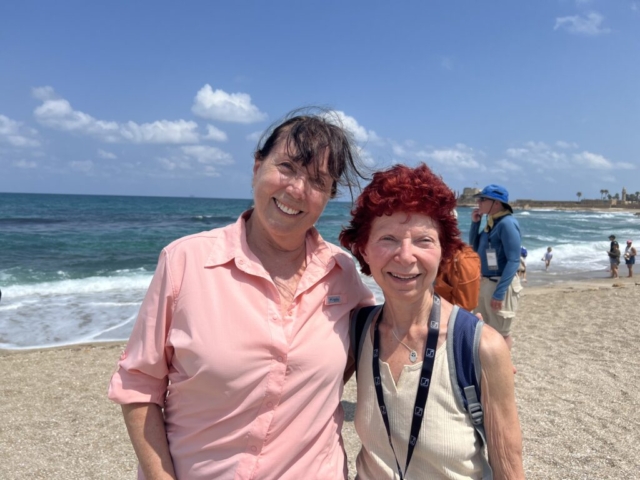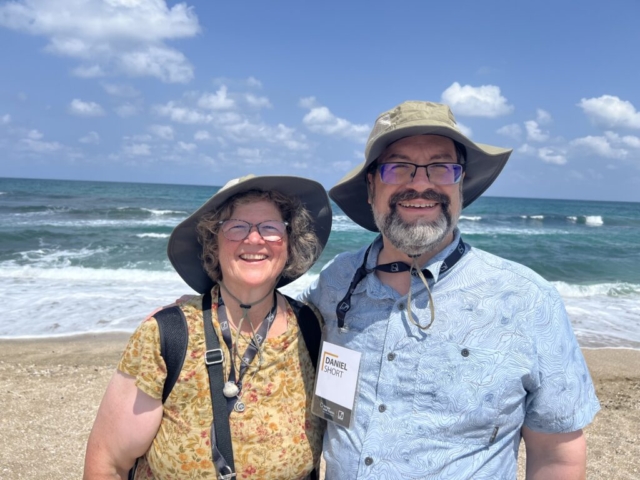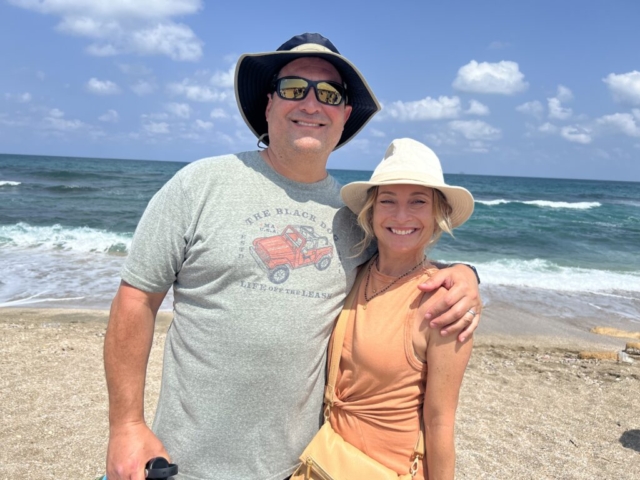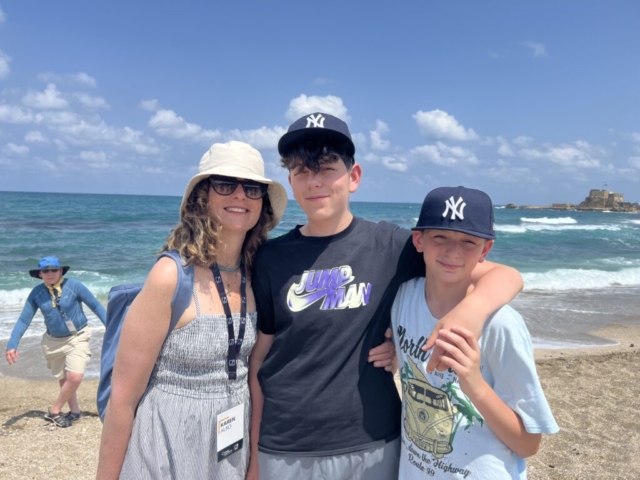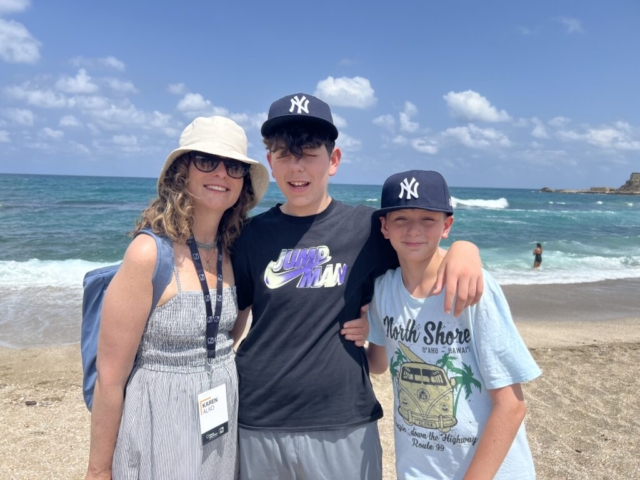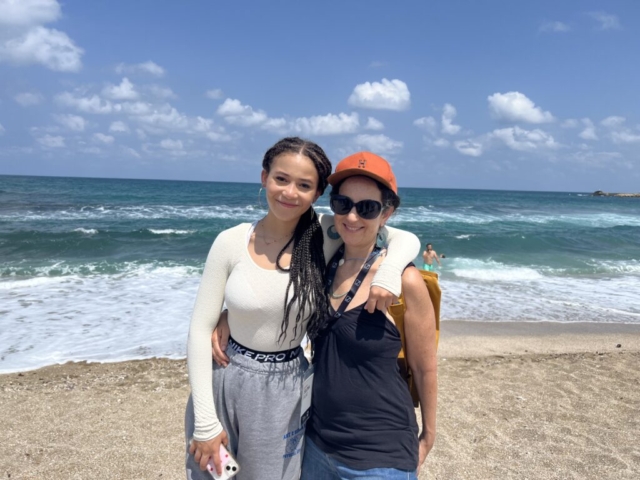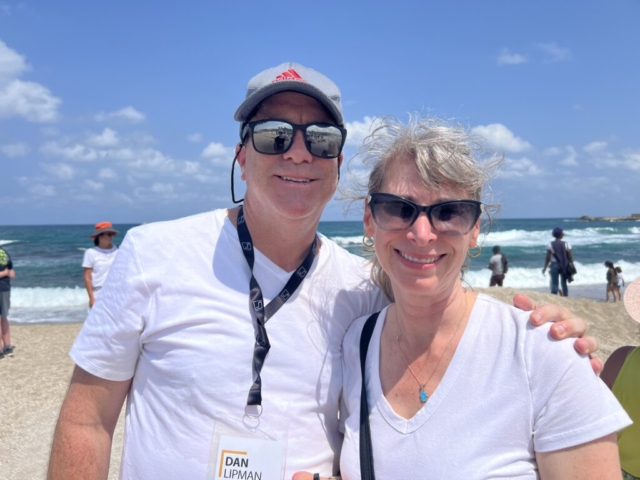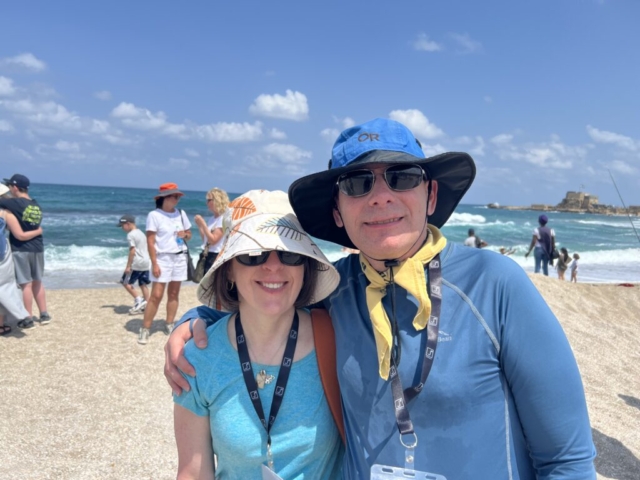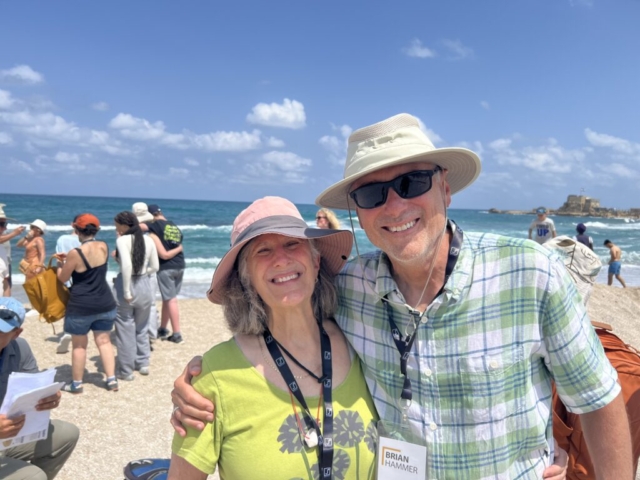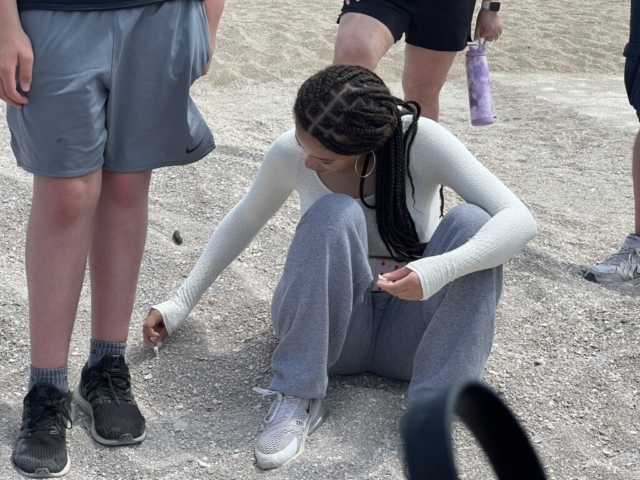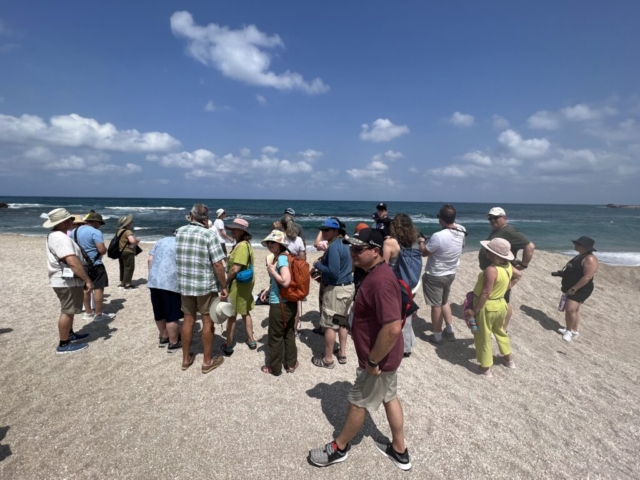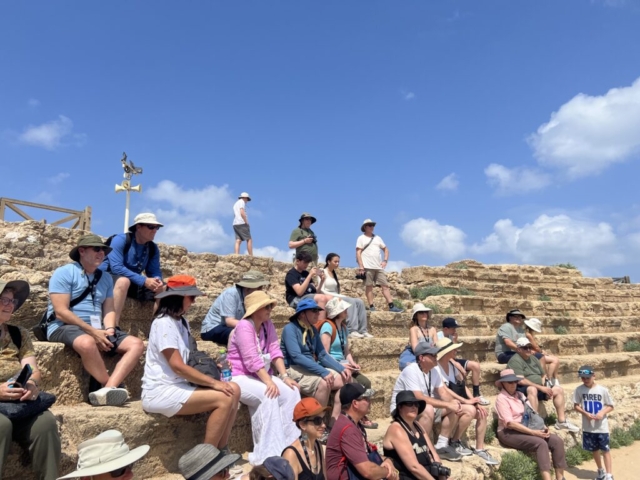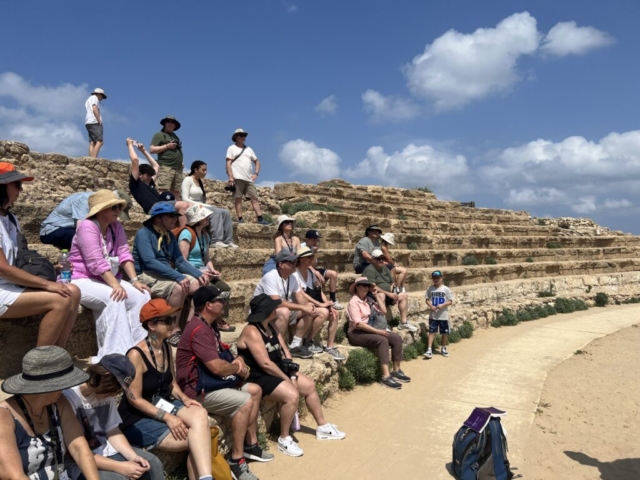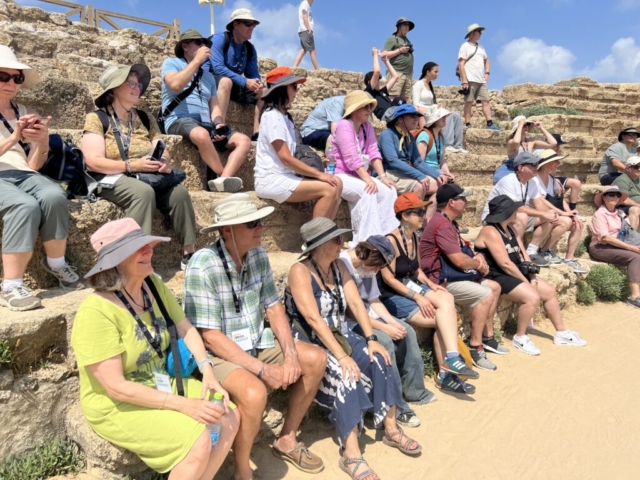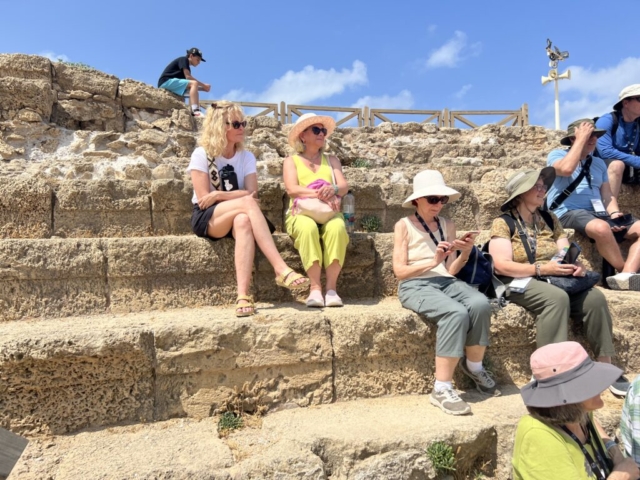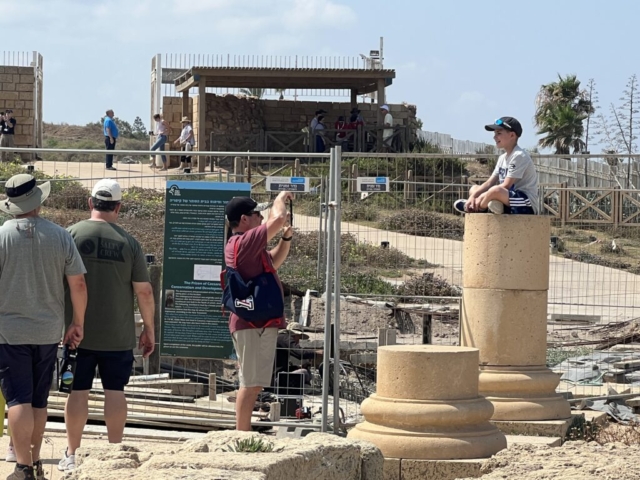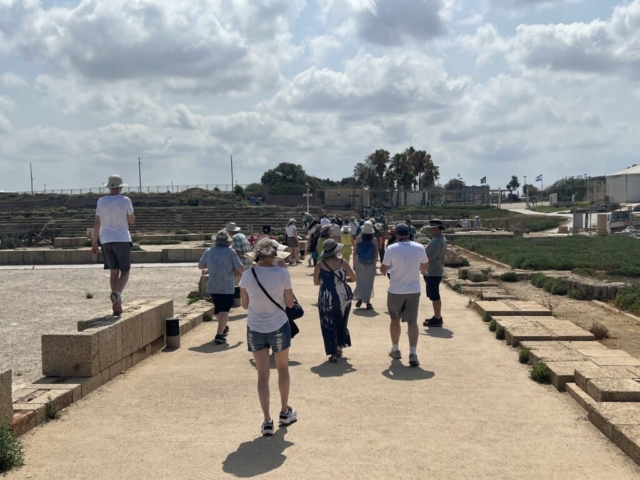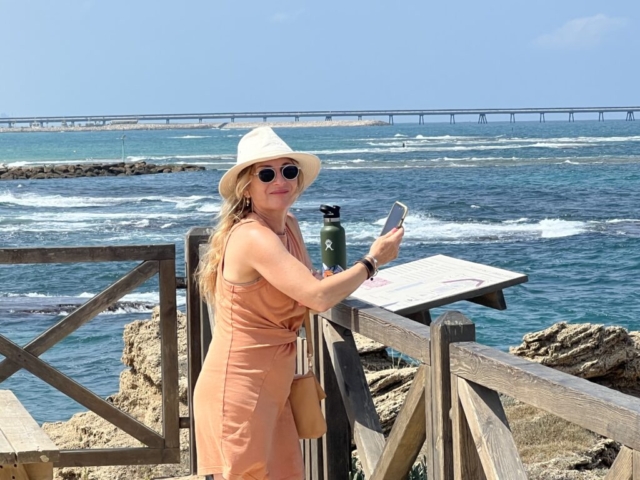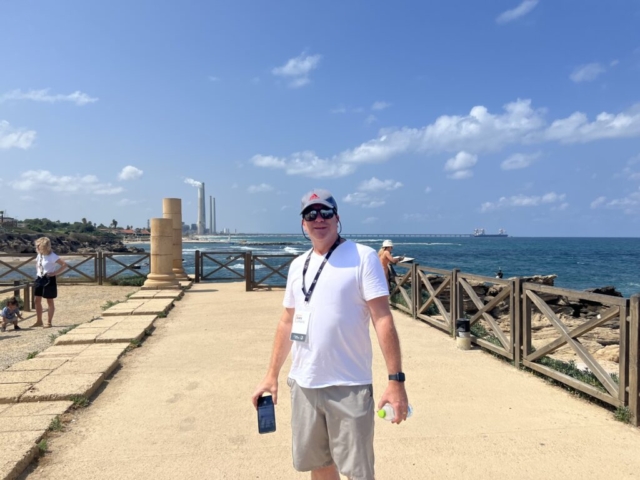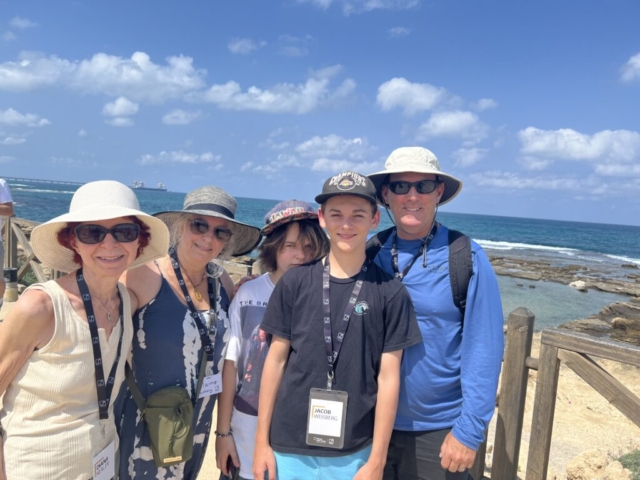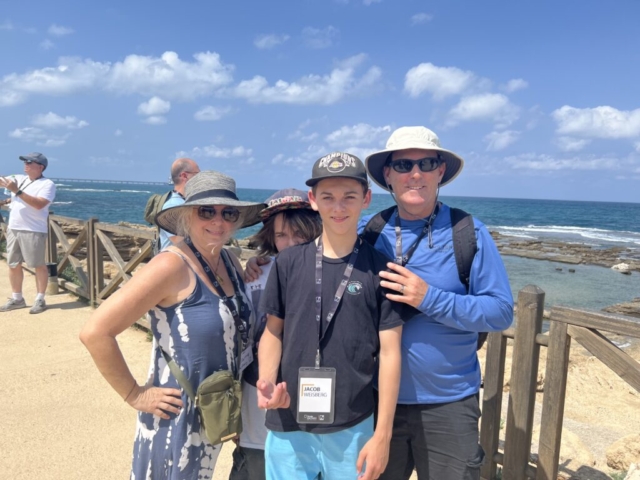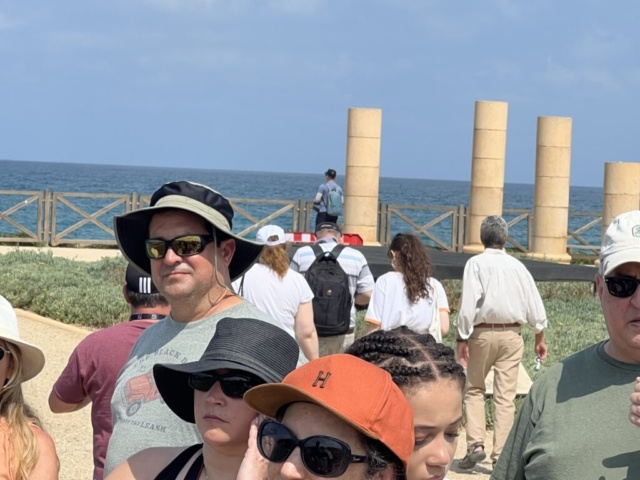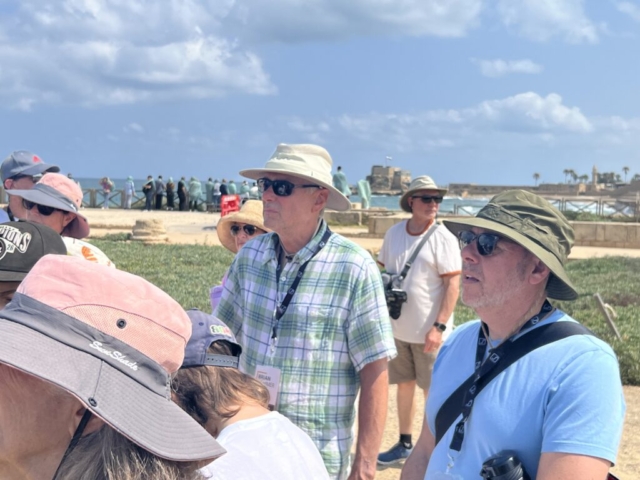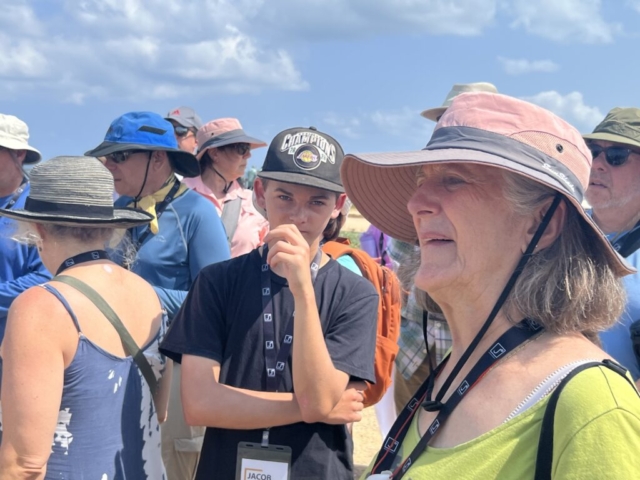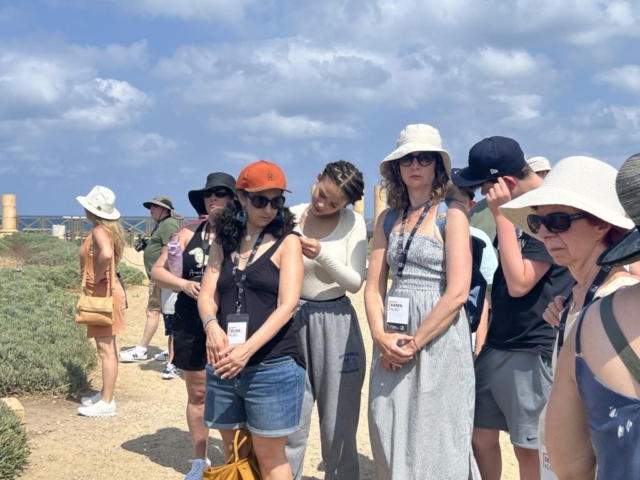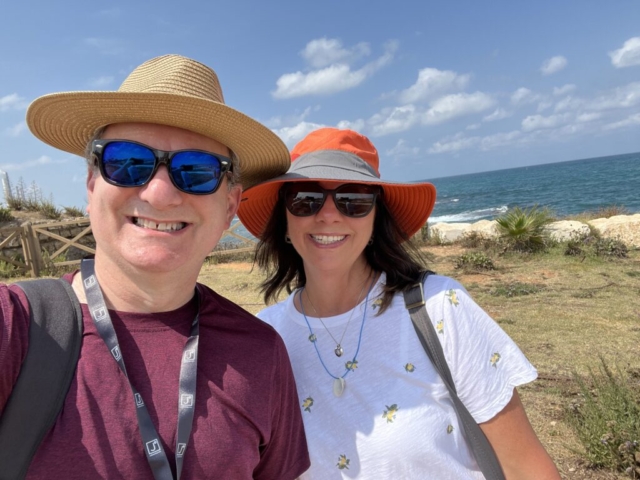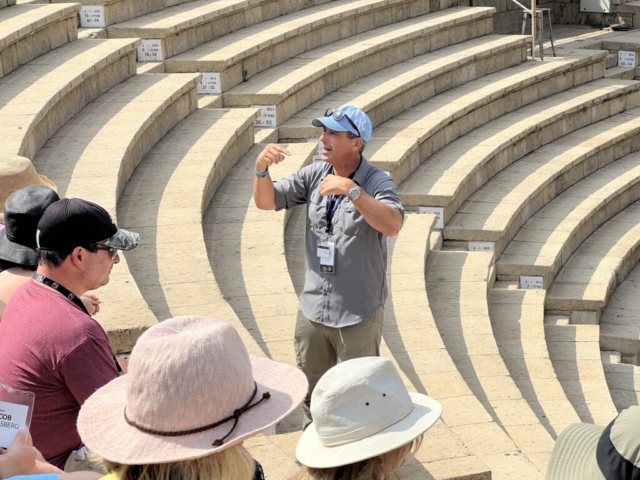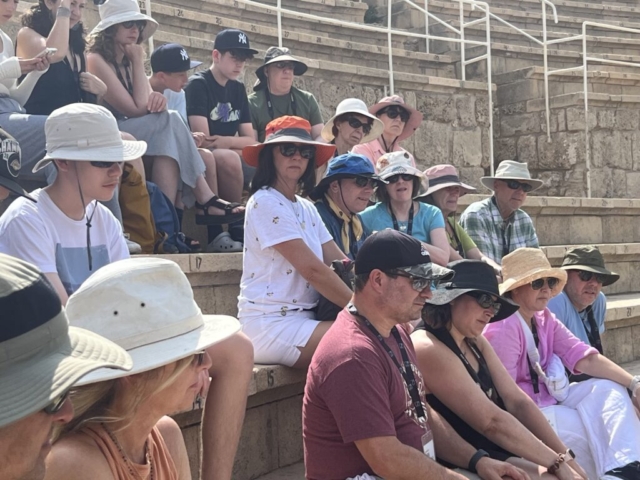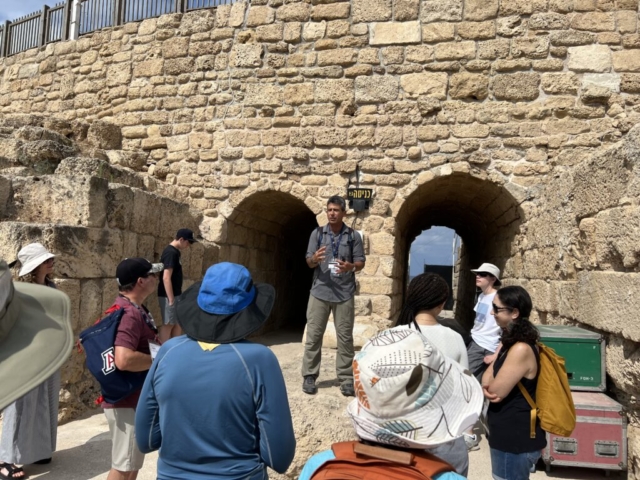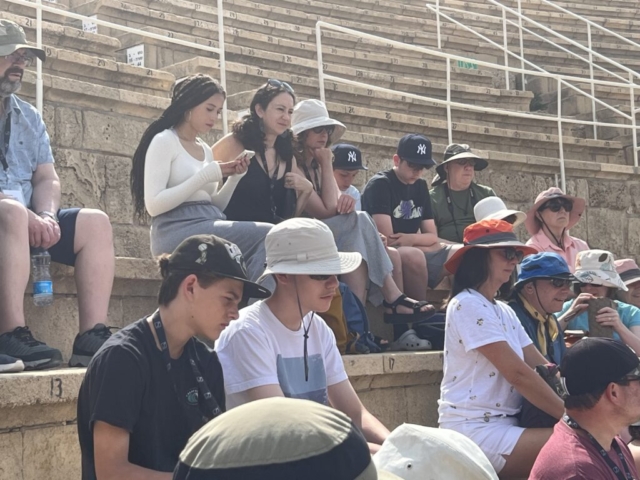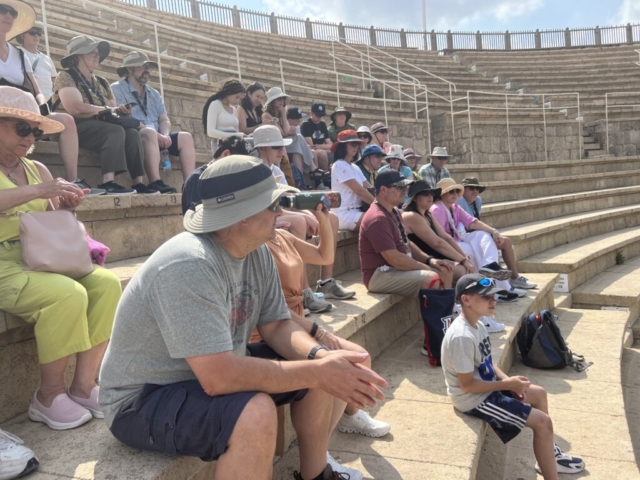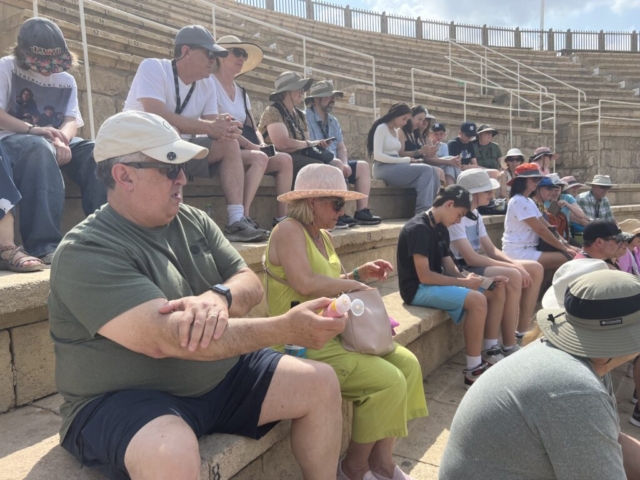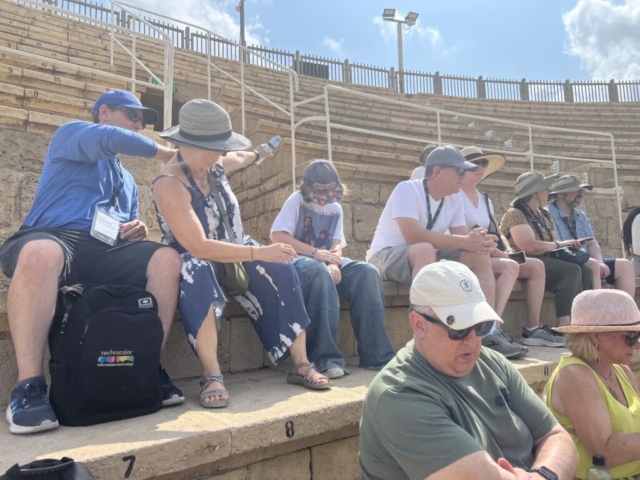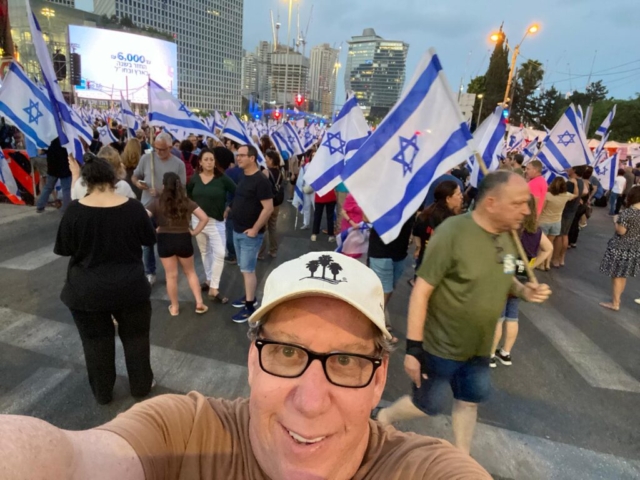Today was filled with moment of contrasts, as are so many moments in Israel. From new and old, Jewish and Roman, beaches and mountains, we often find ourselves navigating between different landscapes, cultures, and traditions.
Jewish and Roman; New and Ancient
We left the new and vibrant city of Tel Aviv after having had a wonderful night. Many members of our group used their last night in Tel Aviv to take walks along the beach and eat at nice restaurants. However, Rick Dictor, a long-time TAE member, instead attended the pro-democracy rally and was deeply moved by his experience. Hopefully he can share more in a future post.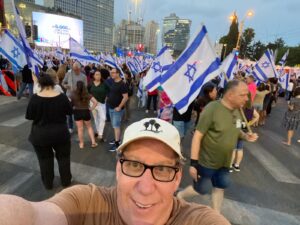
As we headed north along the coast, we came to an ancient construction that is just over 2000 years old. It was built by King Harod, the last of the Jewish Kings. To be honest, he wasn’t deeply Jewish. What was more important to him was currying favor with and impressing the Romans who were his benefactors. He did rebuild and expand the ancient Temple building, which was important to many of the religious Jews of the time. In fact, the Western Wall that we visit today was part of Harod’s expansion project for the ancient Temple. However he wanted to impress the Romans in a bigger and less “Jewy” way.
 His idea was to build a large theater right along the ocean. Think what you will about Harod, he knew how to select a beautiful setting for his four-thousand-seat theater, with the sounds of the waves just off in the distance. The plays they produced could be grand or even bawdy, but they certainly not within the Jewish mode of entertainment in the ancient world.
His idea was to build a large theater right along the ocean. Think what you will about Harod, he knew how to select a beautiful setting for his four-thousand-seat theater, with the sounds of the waves just off in the distance. The plays they produced could be grand or even bawdy, but they certainly not within the Jewish mode of entertainment in the ancient world. 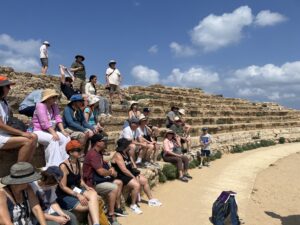 Harod also built a hippodrome to race chariots, a favorite Roman activity. However, and in that same spot, over a hundred years into the future, Rabbi Akiba, was executed for supporting a rebellion against Rome.
Harod also built a hippodrome to race chariots, a favorite Roman activity. However, and in that same spot, over a hundred years into the future, Rabbi Akiba, was executed for supporting a rebellion against Rome.
Harod’s insistence of becoming more Roman than the Romans themselves showed the promise and challenge of adopting other people’s ideas and practices, and making them our own.
Sea to Mountains
W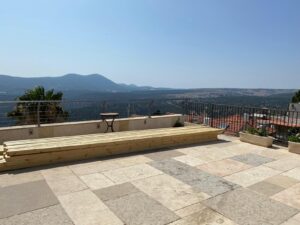 e left the ocean-side theater and drove up to the hill/mountain country of Tsfat. Tsfat is known for many things. It is the seat of government for the northern region of Israel and is one of Judaism’s four holy cities: Jerusalem, Tiberias, Hebron and Tsfat. There is something mystical and magical that happens on mountains. The Torah was given on a mountain. Moses died on a mountain, so did his brother, Aaron, the High Priest. Harod’s Temple was placed on a sacred mountain. There is something about mountains that leads many people to experience God’s presence in those high places. And having a direct, personal experience of God is the essence of mysticism: people can experience and learn from direct contact with God’s presence. We explored the synagogue of the Rabbi Isaac Luria who came up with a radical new way of experiencing God. Rather than try to find where God is? Luria suggested that God is actually endless divine light that goes on, literally, forever. However, if God fills up the entire universe, then there is no room for humanity and the universe. By reading the Torah very carefully, he came to view God as having created a bubble within God’s divine light. That bubble made room for humanity. These mystics came to believe that, if we wanted to experience God directly, we seek God in the place where God is absence, not the places where god is present.
e left the ocean-side theater and drove up to the hill/mountain country of Tsfat. Tsfat is known for many things. It is the seat of government for the northern region of Israel and is one of Judaism’s four holy cities: Jerusalem, Tiberias, Hebron and Tsfat. There is something mystical and magical that happens on mountains. The Torah was given on a mountain. Moses died on a mountain, so did his brother, Aaron, the High Priest. Harod’s Temple was placed on a sacred mountain. There is something about mountains that leads many people to experience God’s presence in those high places. And having a direct, personal experience of God is the essence of mysticism: people can experience and learn from direct contact with God’s presence. We explored the synagogue of the Rabbi Isaac Luria who came up with a radical new way of experiencing God. Rather than try to find where God is? Luria suggested that God is actually endless divine light that goes on, literally, forever. However, if God fills up the entire universe, then there is no room for humanity and the universe. By reading the Torah very carefully, he came to view God as having created a bubble within God’s divine light. That bubble made room for humanity. These mystics came to believe that, if we wanted to experience God directly, we seek God in the place where God is absence, not the places where god is present.
Mystics are not the only people who help us see the world radically differently. Artists, too, can open us up to new ways of the world, and Tsfat is filled with artists.  Even their doors and windows are small, beautiful pieces of art.
Even their doors and windows are small, beautiful pieces of art.
 If you look upon the walls themselves, it is as though they have a beautiful heart that beats to a divine pulse.
If you look upon the walls themselves, it is as though they have a beautiful heart that beats to a divine pulse. 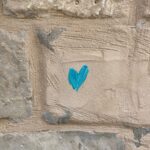 The artist’s colony in Tsvat is a place of pilgrimage where people seek beautiful art, often with some kind of Jewish theme. It was wonderful to see the mezuzot, tallitot, and Havdalah candles that were on a mission to enhance people’s Jewish lives.
The artist’s colony in Tsvat is a place of pilgrimage where people seek beautiful art, often with some kind of Jewish theme. It was wonderful to see the mezuzot, tallitot, and Havdalah candles that were on a mission to enhance people’s Jewish lives.
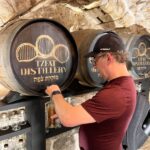 However, not all gifts are religious. Sandy and I purchased a bottle Golani whisky and the Katzrin Distillery’s Gold Label Arat. We shared it with the other adults on the group and appreciated the artistry placed in this bottle of spirits.
However, not all gifts are religious. Sandy and I purchased a bottle Golani whisky and the Katzrin Distillery’s Gold Label Arat. We shared it with the other adults on the group and appreciated the artistry placed in this bottle of spirits.
Urban to Pastoral
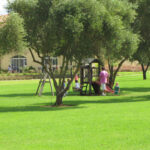 Our final moment of contrasts is when we remembered how we left Tel Aviv this morning, only to end the day at the Guest House of Kibbutz Kfar Blum. Really more a hotel than a guest house, the name of this property is Pastoral: Hotel Kfar Bloom guest house. As we stepped off the bus, we could feel any tension of the trip melt away as we breathed in the clean air and felt totally at peace.
Our final moment of contrasts is when we remembered how we left Tel Aviv this morning, only to end the day at the Guest House of Kibbutz Kfar Blum. Really more a hotel than a guest house, the name of this property is Pastoral: Hotel Kfar Bloom guest house. As we stepped off the bus, we could feel any tension of the trip melt away as we breathed in the clean air and felt totally at peace.


